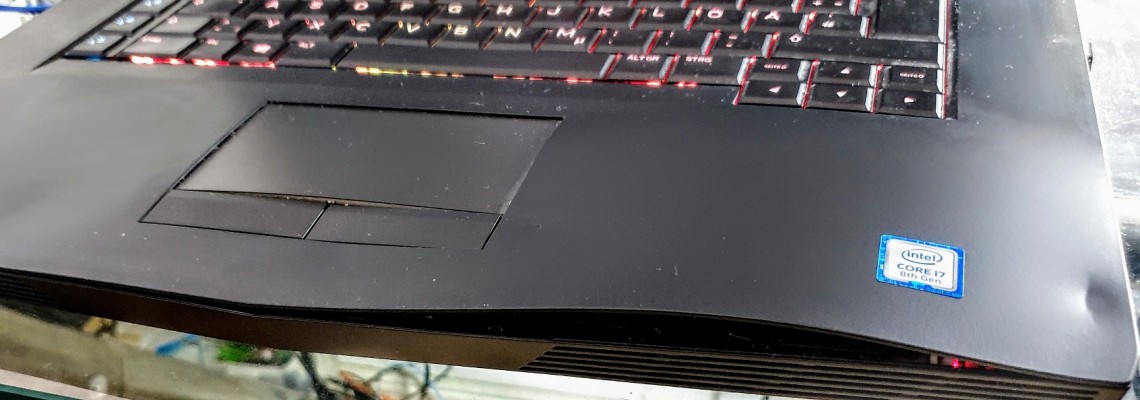What is Laptop battery swelling?
Laptop battery swelling is a condition that occurs when a laptop’s battery pack expands and becomes larger than its original size. This can happen due to a variety of reasons, such as overcharging, exposure to heat, or a faulty battery.
When a laptop battery swells, it can cause the laptop to become unstable and difficult to use. The battery can push against the keyboard or trackpad, making them unusable, and in severe cases, it can even damage the internal components of the laptop.
If you notice that your laptop’s battery is swelling, it’s important to stop using the laptop immediately and remove the battery. You should also avoid puncturing or damaging the battery, as it can be dangerous and cause a fire or explosion.
It’s recommended that you replace the battery as soon as possible to avoid further damage to your laptop and ensure your safety. You can contact your laptop’s manufacturer or a professional repair service to help you replace the battery.
If your laptop battery is swelling, it is important to take immediate action to prevent any further damage or safety hazards. Here are the steps you can take:
Stop using the laptop: If your laptop battery is swelling, turn off your laptop immediately and unplug it from the power source. Do not use the laptop until the battery has been replaced or removed.
Remove the battery: If your laptop battery is removable, carefully remove it from the laptop. Avoid puncturing or puncturing the battery pack.
Dispose of the battery: If the battery is swollen or damaged, it is important to dispose of it properly. Contact your local waste management department for guidance on how to dispose of lithium-ion batteries safely.
Replace the battery: If your laptop battery is not removable, you may need to take your laptop to a repair shop or contact the manufacturer for a replacement battery. Be sure to purchase a battery that is compatible with your laptop model.
Get your laptop checked: Swelling of the battery may have caused damage to the laptop itself. Get your laptop checked by a professional to ensure that there is no further damage and that it is safe to use.
Remember, it is important to take immediate action if you notice any signs of laptop battery swelling. Do not ignore this issue as it can cause damage to the laptop or even become a safety hazard.
How To Avoid Laptop Battery Swelling?
Here are some tips to avoid laptop battery swelling:
Use your laptop regularly: The more you use your laptop, the less likely it is for the battery to swell. If you leave your laptop unused for a long time, the battery can degrade and cause swelling.
Avoid extreme temperatures: High temperatures can damage the battery and cause it to swell. Keep your laptop in a cool and dry place, and avoid exposing it to direct sunlight or extreme temperatures.
Don’t overcharge: Overcharging your laptop battery can cause it to swell. Make sure to unplug your laptop from the charger once it’s fully charged.
Use the correct charger: Using the wrong charger can cause the battery to overcharge or undercharge, leading to swelling. Make sure to use the charger that came with your laptop or a compatible one.
Avoid physical damage: Physical damage to the battery or laptop can cause the battery to swell. Be careful when handling your laptop and avoid dropping it or hitting it.
Replace the battery when necessary: If your laptop battery is old or damaged, replace it as soon as possible. A damaged battery can cause serious problems, including swelling and fire.
By following these tips, you can help prevent laptop battery swelling and ensure that your laptop remains safe and functional.
FAQs:
No. Swollen battery may impact the performance of the laptop. To prevent possible further damage to the device enclosure or internal components leading to malfunction, discontinue the use of the laptop and discharge it by disconnecting the AC adapter and letting the battery drain.
As lithium-ion batteries age, the chemical reactions that produce power no longer complete fully, resulting in the creation of gasses that can cause the battery to swell. Additionally, manufacturing errors or damage to the membranes that separate the internal layers of the battery can also lead to swelling.
How to prevent laptop battery swelling and explosion
1- Don’t leave your device connected to a charger all day. …
2- Replace your device battery if it’s broken or not performing efficiently. …
3- Use the correct charger. …
4- Upgrade your laptop when it’s out of warranty. …
5- Store the device in a cool, dry environment.
Once a battery becomes swollen, it no longer works properly and you should replace it. Do not try to put a swollen battery in the freezer—it won’t help and could put your home at risk.
Following are the signs of a swollen battery,
1- Touchpad or Keyboard lifting.
2- System rocking when placed on an even surface (not related to broken or missing feet).
3- Uneven seams where case/cover parts meeting (enclosure splitting).
4- A swollen battery has the potential to physically damage the product enclosure.

